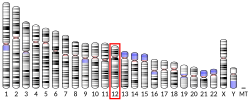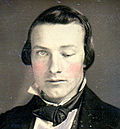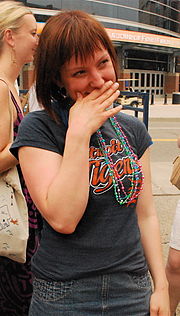The myogenic mechanism is how arteries and arterioles react to an increase or decrease of blood pressure to keep the blood flow constant within the blood...
9 KB (1,119 words) - 07:47, 17 October 2024
Tubuloglomerular feedback (redirect from Tubuloglomerular feedback mechanism)
increasing glomerular capillary pressure. Juxtaglomerular Apparatus Kidney Myogenic Mechanism Renal corpuscle Transforming growth factor Arulkumaran N, Turner CM...
21 KB (2,605 words) - 07:10, 21 June 2024
Juxtaglomerular cell tumor Hyperaldosteronism Tubuloglomerular feedback Myogenic mechanism "Dictionary.com". Retrieved 11 June 2015. Gonzalez-Vicente, Agustin;...
7 KB (763 words) - 17:16, 31 December 2023
Smooth muscle (section Other contractile mechanisms)
Atherosclerosis. Atromentin has been shown to be a smooth muscle stimulant. Myogenic mechanism List of distinct cell types in the adult human body Betts, J. Gordon;...
37 KB (4,736 words) - 23:58, 3 October 2024
Renin–angiotensin system Vasoconstrictors Vasodilators Autoregulation Myogenic mechanism Tubuloglomerular feedback Cerebral autoregulation Paraganglia Aortic...
10 KB (946 words) - 02:21, 6 April 2024
MYF5 (redirect from Myogenic factor 5)
Myogenic factor 5 is a protein that in humans is encoded by the MYF5 gene. It is a protein with a key role in regulating muscle differentiation or myogenesis...
18 KB (2,355 words) - 11:57, 21 June 2022
MyoD (redirect from Myogenic differentiation 1)
proteins known as myogenic regulatory factors (MRFs). These bHLH (basic helix loop helix) transcription factors act sequentially in myogenic differentiation...
27 KB (3,374 words) - 10:55, 15 July 2024
a release in adenosine, which triggers the blood vessel to vasodilate. Myogenic control, which originates from the wall of the blood vessel itself and...
8 KB (1,012 words) - 06:15, 24 January 2024
Myogenesis (redirect from Myogenic cells)
Myf5 are members of the myogenic bHLH (basic helix-loop-helix) proteins transcription factor family. Cells that make myogenic bHLH transcription factors...
24 KB (2,738 words) - 02:09, 3 September 2024
Ptosis (eyelid) (section Mechanism)
ptosis. Different trauma can cause and induce many different mechanisms. For example, myogenic ptosis results from a direct injury to the levator muscle...
30 KB (3,461 words) - 18:37, 5 September 2024
Edition, Campbell, 1999 Perry R, Rudnick M (2000). "Molecular mechanisms regulating myogenic determination and differentiation". Front Biosci. 5: D750–67...
37 KB (4,500 words) - 02:23, 3 September 2024
MYF6 (redirect from Myogenic factor 6)
Myogenic factor 6 (also known as Mrf4 or herculin) is a protein that in humans is encoded by the MYF6 gene. This gene is also known in the biomedical literature...
9 KB (1,166 words) - 18:37, 22 August 2024
Phosphoglucomutase (section Reaction mechanism)
glucose 6-phosphate. There are two forms of PGM1-CDG: 1.) exclusively myogenic, and 2.) multi-system (including muscles). The usual pathway for glycogen...
21 KB (2,346 words) - 01:07, 24 March 2024
concentration of potassium ions. The mechanisms of vasodilation are predominantly local metabolites and myogenic effects. Increased metabolic activity...
8 KB (952 words) - 19:38, 25 January 2024
Vasoconstriction (section General mechanism)
circulating hormones, and intrinsic mechanisms inherent to the vasculature itself (also referred to as the myogenic response).[citation needed] Exposure...
19 KB (1,681 words) - 19:26, 2 November 2024
Cerebral autoregulation (section Myogenic regulation)
outcome. Three different mechanisms are thought to contribute to the process of cerebral autoregulation. These are metabolic, myogenic and neurogenic. Metabolic...
6 KB (688 words) - 19:05, 15 September 2023
posture maintenance. Contractions in cardiac muscle tissue are due to a myogenic response of the heart's pacemaker cells. These cells respond to signals...
8 KB (944 words) - 19:41, 19 January 2024
(published February 1999), pp. 22–6, PMID 10377602 Folkow, B (1989), "Myogenic mechanisms in the control of systemic resistance. Introduction and historical...
14 KB (1,601 words) - 18:42, 26 October 2023
patterns during development. Perry R, Rudnick M (2000). "Molecular mechanisms regulating myogenic determination and differentiation". Front Biosci. 5: D750–67...
3 KB (403 words) - 08:40, 25 July 2024
veins from other areas of the skin, facial veins responded with an active myogenic contraction to passive stretch and were therefore able to develop an intrinsic...
9 KB (1,112 words) - 18:23, 29 October 2024
Uterine contraction (section Mechanism)
pattern as the labour progresses. This transition is governed by various myogenic, neurogenic, and hormonal factors working together. As labour progresses...
15 KB (1,707 words) - 11:25, 14 September 2024
Metabolic myopathy (section Mechanism)
exercise (dyspnea/tachypnea/hyperpnea and tachycardia), Exercise-induced myogenic hyperuricemia (exercise-induced accelerated breakdown of purine nucleotides...
51 KB (5,290 words) - 14:37, 30 October 2024
Autoregulation (redirect from Autoregulatory mechanisms)
sensitive to increased or decreased blood flow, and several mechanisms (metabolic, myogenic, and neurogenic) are involved in maintaining an appropriate...
11 KB (1,341 words) - 23:13, 13 September 2024
Hitting the wall (section Mechanisms)
Excessive use of the myokinase reaction and purine nucleotide cycle leads to myogenic hyperuricemia. In muscle glycogenoses (muscle GSDs), an inborn error of...
13 KB (1,468 words) - 00:58, 30 October 2024
Unlike skeletal muscle, the contractions of smooth and cardiac muscles are myogenic (meaning that they are initiated by the smooth or heart muscle cells themselves...
62 KB (7,395 words) - 14:24, 5 October 2024
pair of somites. The interaction of other signaling molecules, such as myogenic regulatory factors, with this gradient promotes the development of other...
12 KB (1,405 words) - 04:19, 16 October 2023
most mammals. The avian circulatory system is driven by a four-chambered, myogenic heart contained in a fibrous pericardial sac. This pericardial sac is filled...
59 KB (7,206 words) - 15:34, 16 September 2024
electric shock. Each such group is a clade. Most electric organs evolved from myogenic tissue (which forms muscle), however, one group of Gymnotiformes, the Apteronotidae...
31 KB (2,961 words) - 05:36, 27 September 2024
Forkhead box protein O1 (section Mechanism of action)
this gene has not yet been determined; however, it may play a role in myogenic growth and differentiation. FOXO1 is essential for the maintenance of human...
28 KB (3,343 words) - 18:02, 7 November 2023





















